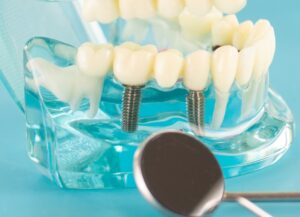 If you gauge a tooth replacement option by its appearance, most modern restorations are highly capable of fully restoring your smile. However, your teeth play much more important roles in your smile than just filling out its appearance, and losing a tooth comes with many more concerns than those that affect how your smile looks. Therefore, the quality of your tooth replacement should be judged by how well it restores your lost teeth’s ability to function, as well as their roles in your overall oral health. Because they’re the only solution that replaces the roots of lost teeth, dental implants are often the best way to achieve this.
If you gauge a tooth replacement option by its appearance, most modern restorations are highly capable of fully restoring your smile. However, your teeth play much more important roles in your smile than just filling out its appearance, and losing a tooth comes with many more concerns than those that affect how your smile looks. Therefore, the quality of your tooth replacement should be judged by how well it restores your lost teeth’s ability to function, as well as their roles in your overall oral health. Because they’re the only solution that replaces the roots of lost teeth, dental implants are often the best way to achieve this.
The ability to keep your restoration in place
Mimicking lost teeth roots means that dental implants anchor your dental restoration in place the same way roots do for your healthy, natural teeth. This creates several immediately noticeable benefits for your restoration, such as the improved comfort and stability that your restoration will enjoy. With root-like anchors, your restoration will feel and function more closely to your healthy, natural teeth, without shifting out of place uncomfortably as some traditional restorations may do after some time. In addition, your implant-supported restoration can remain more stable and durable as you subject it to the pressures of biting and chewing your food every day.
The way they interact with your jawbone structure
Supporting your restoration as you bite and chew is important, and is a significant factor in the realism of implant restorations. However, many of the benefits of this aren’t immediately noticeable, despite having profound implications for your long-term oral health. These benefits stem from the restoration of stimulation within your jawbone, which was reduced when you lost one or more teeth roots. This reduced stimulation causes fewer nutrients to reach your jawbone, which in turn causes the jawbone structure to shrink over time. Known as jawbone erosion, this can increase your risks of further tooth loss and impact your facial appearance to varying degrees. However, it can largely be prevented thanks to the way in which dental implants interact with your jawbone structure.
Their impact on your long-term oral health
Keeping your jawbone structure strong doesn’t just reduce your risks of tooth loss. It also helps improve your long-term oral health in several other important ways. For example, any changes to the size, shape, or contour of your jawbone can have a profound impact on how your other oral structures function. Your jaw joints and muscles may become damaged under the strain, for example, leading to complications such as TMJ disorder and other bite dysfunctions.
Restore your smile with one or more dental implants
After you’ve experienced tooth loss, dental implants can give you the best way to restore your smile to its former health and glory. To learn more, or to schedule a consultation, call Santa Rosa Oral Surgery in Santa Rosa, CA, today at 707-545-4625.

